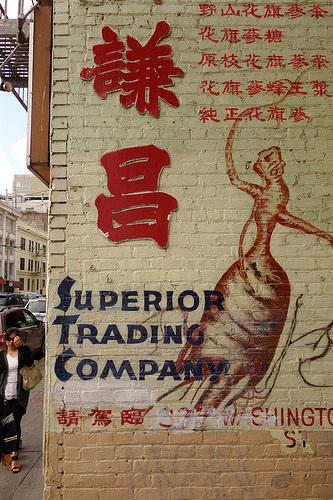
‘Ginseng Mural,’ by vhines200 [flickr.com/vhines200]. License https://creativecommons.org/licenses/by-nd/2.0/
The herbal sales rep I spoke with wasn’t sure either. After all, he just works there. He simply cited the possibilities above. But I do understand that there’s a hierarchy of knowledge within organizations, and sometimes the sales rep is the last to know.
I now suspect that the disruption of ginseng supply is due to the West Coast port shutdown last February. While that work stoppage has had a broad adverse effect on the economy, right now I’m just wanting to be able to cook up more of my longevity herb. I feel myself aging as I write this.
As I wonder when my ginseng will return, a greater question comes to mind: Why rely on Chinese herbs from far-away China? Many of the herbs in the Chinese pharmacopeia were adopted from lands outside of China anyway.
Many Chinese herbs can be effectively cultivated on U.S. soil, and Asian ginseng can grow well in the southeastern climate and habitat.
In case you want to bury your hands in some soil, and take the helm on local herb cultivation, The Chinese Medicinal Herb Farm, by Peg Schafer, is a good place to start.
Carl is a former engineer who applies rational thought to the often subjective nature of traditional healing. He practices acupuncture in San Diego, CA.
